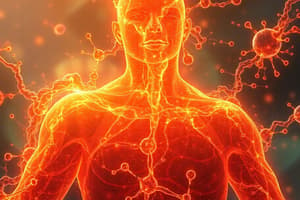Podcast
Questions and Answers
What syndrome is commonly associated with starvation, particularly in children under 1 year of age?
What syndrome is commonly associated with starvation, particularly in children under 1 year of age?
- Kwashiorkor
- Beriberi
- Marasmus (correct)
- Anemia
In marasmus, which component does muscle primarily provide to the liver?
In marasmus, which component does muscle primarily provide to the liver?
- Fatty acids
- Glucose
- Amino acids (correct)
- Ketone bodies
What is the primary function of fatty acyl-CoA in the context of starvation?
What is the primary function of fatty acyl-CoA in the context of starvation?
- Production of insulin
- Ketogenesis (correct)
- Formation of glycogen
- Synthesis of glucose
Which metabolic processes are primarily utilized by the brain during starvation?
Which metabolic processes are primarily utilized by the brain during starvation?
What can lead to marasmus in adults?
What can lead to marasmus in adults?
What occurs during hepatic gluconeogenesis in response to fasting?
What occurs during hepatic gluconeogenesis in response to fasting?
What is the relationship between hepatic gluconeogenesis and the urea cycle?
What is the relationship between hepatic gluconeogenesis and the urea cycle?
What happens to acetyl-CoA during starvation?
What happens to acetyl-CoA during starvation?
What role does oxaloacetate play in Starvation metabolism?
What role does oxaloacetate play in Starvation metabolism?
What is the primary source of glucose during prolonged fasting?
What is the primary source of glucose during prolonged fasting?
What process occurs simultaneously with lipolysis in adipose tissue during fasting?
What process occurs simultaneously with lipolysis in adipose tissue during fasting?
Which of the following best explains the increase in ketone bodies during starvation?
Which of the following best explains the increase in ketone bodies during starvation?
What is the fate of fatty acids during the fasting state?
What is the fate of fatty acids during the fasting state?
Flashcards are hidden until you start studying
Study Notes
Fasting and Starvation Metabolism
- Hepatic gluconeogenesis relies on protein degradation from muscle and triglyceride breakdown from adipose tissue.
- Glucose synthesis from alanine in the liver is linked to the urea cycle, which is crucial in maintaining nitrogen balance.
- Hepatic ketogenesis utilizes fatty acids derived from triglyceride degradation, leading to ketone body formation.
Starvation Process
- Fatty acids are broken down via β-oxidation, yielding acetyl-CoA which enters the tricarboxylic acid (TCA) cycle for oxidative metabolism into CO2.
- The presence of oxaloacetate is necessary for acetyl-CoA entry into the TCA cycle; during starvation, gluconeogenesis reduces oxaloacetate availability.
- Increased acetyl-CoA levels during starvation promote the production of ketone bodies instead of continuing through the TCA cycle.
Marasmus Syndrome
- Marasmus is a severe form of malnutrition prevalent in children under 1 year in developing countries, but can affect all age groups.
- In marasmus, the body mobilizes fat as an energy source for ketogenesis while muscle-derived amino acids support gluconeogenesis in the liver.
- The brain utilizes both glucose and ketone bodies as energy sources during this state of malnutrition.
- Prolonged starvation exhausts energy and protein reserves, potentially leading to death from starvation.
- Adults may experience marasmus due to diseases affecting swallowing or food access, such as throat or esophageal cancer, dementia, or stroke.
Studying That Suits You
Use AI to generate personalized quizzes and flashcards to suit your learning preferences.



